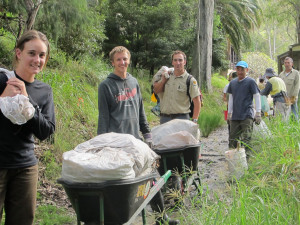 Native plants
Native plants
Native gardens are not only beautiful but they provide important habitat, shelter and food for wildlife, improve the island’s biodiversity and help to protect the endangered Pittwater Spotted Gum Forest which is listed as an Endangered Ecological Community. Ecological Communities are a unique combination of native plants, animals and other organisms that provide us with ecosystem services such as clean air and water, nutrients for the soil, protection against erosion and salinity, carbon storage and a healthy environment for threatened species. Planting native plants that have evolved to our local conditions and climate also means that they are easier to grow, resilient and can survive on rainfall alone.
The Northern Beaches Council website has more information:
- Pittwater native plant species guide
- Tips for creating backyard habitat
- Native plants and gardening
- Tree Guide for recommendations for planting trees
Weeds
The proliferation of weeds on Scotland Island are a salutary illustration of what can happen when people plant exotic and even some native plants without adequate care. Garden plants can easily escape and establish themselves as noxious weeds.
Some of the most common weeds on the island are:
- Lantana (Lantana spp)
- Asparagus Fern (Protasparagus aethiopicus & Portasparagus densiflorus)
- Black-eyed Susan (Thunbergia alata)
- Blue Periwinkle (Vinca major)
- Cassia/Winter Senna (Senna pendula var. glabrata & Senna floribunda)
- Crofton Weed (Ageratina spp. adenophora)
- Fishbone Fern (Nephrolepis cordifolia)
- Morning Glory (Ipomoea cairica (coastal))
- Ochna or Mickey Mouse Plant (Ochna serrulata)
- Panic Veldt Grass (Ehrharta erecta)
- Trad (formerly Wandering Jew) (Tradescantia alibflora, T. zebrine, T.spathecea)
- Basket Plant (Callisia fragrans)
- Madeira Vine (Andredera cordifolia)
- Turkey rhubarb (Rumex sagittatus)
By identifying and removing the numerous weed species, i.e. taking away the bad and leaving the good, native regeneration will occur. Planting will hasten the process and stabilise disturbed soil; however, vigilant weeding alone will allow latent natives to re establish.
Particular care should be taken to apply appropriate removal techniques in vulnerable areas, eg: slopes/eroded soil to prevent loss of precious topsoil. Poisoning lantana roots rather than hand removal is recommended in such a location to hold the soil. Plant into such a site with native grasses and groundcovers to stabilise.
Pittwater Ecowarriors have a number of instructional videos on the correct techniques to remove weeds.
For identification and removal information, visit Sydney Weeds.
Hornsby Shire Council has an excellent handbook of weeds and natives that look alike.
